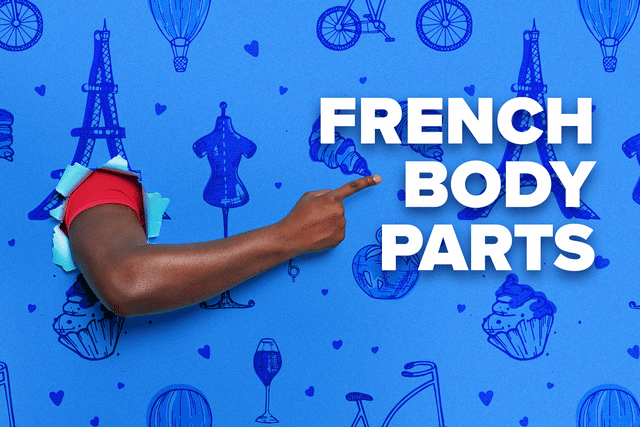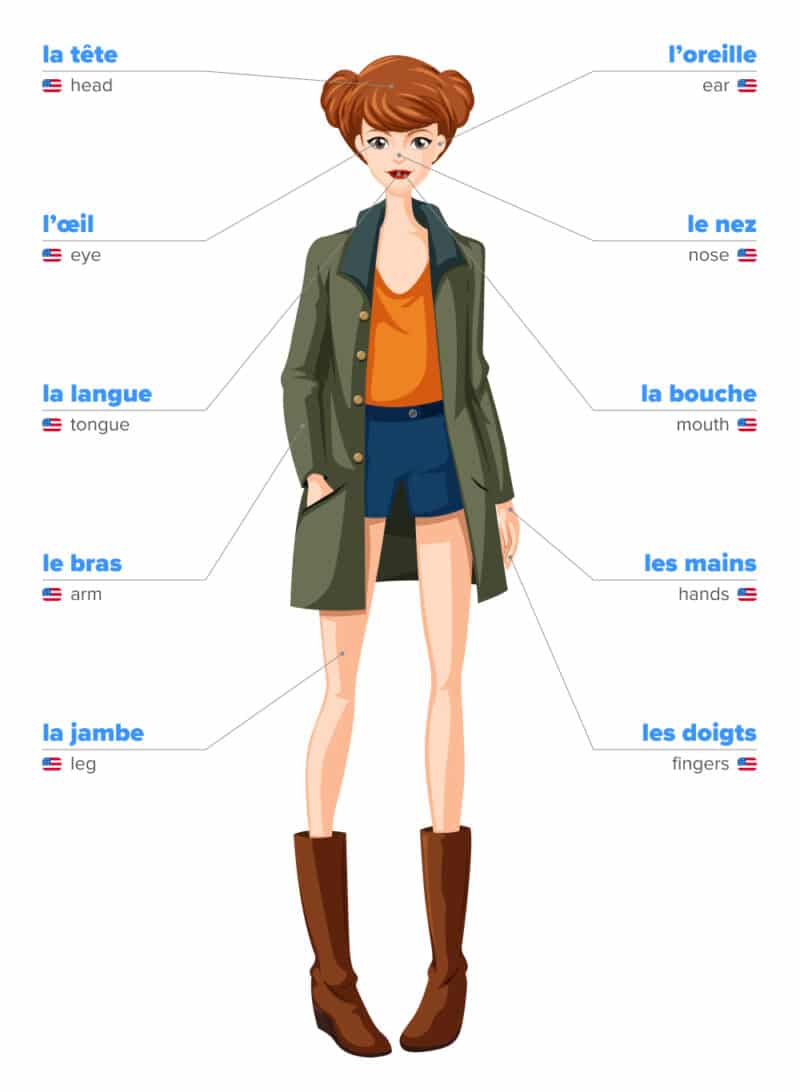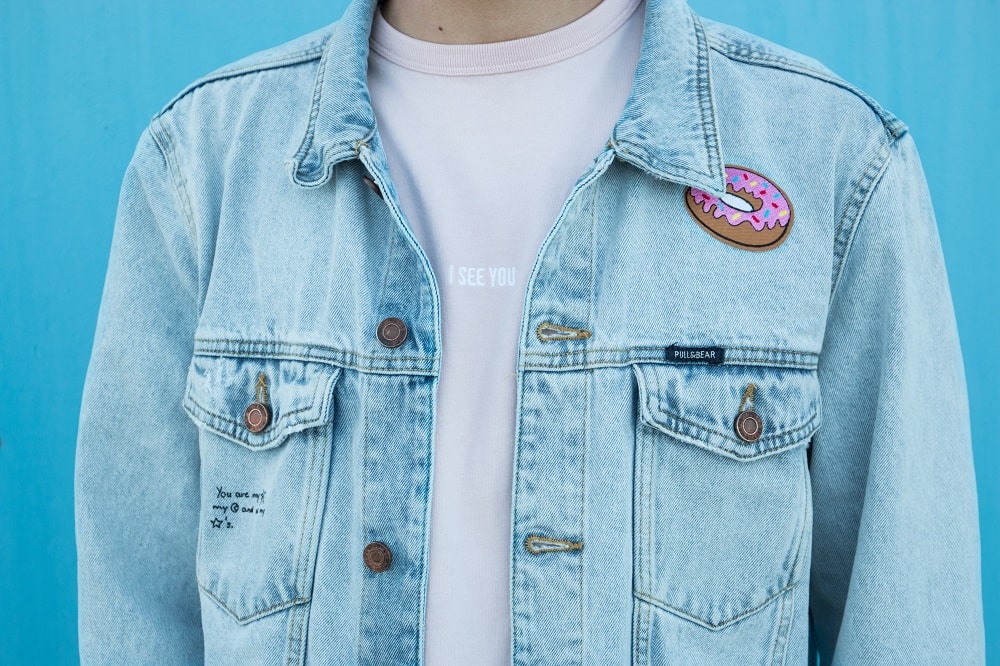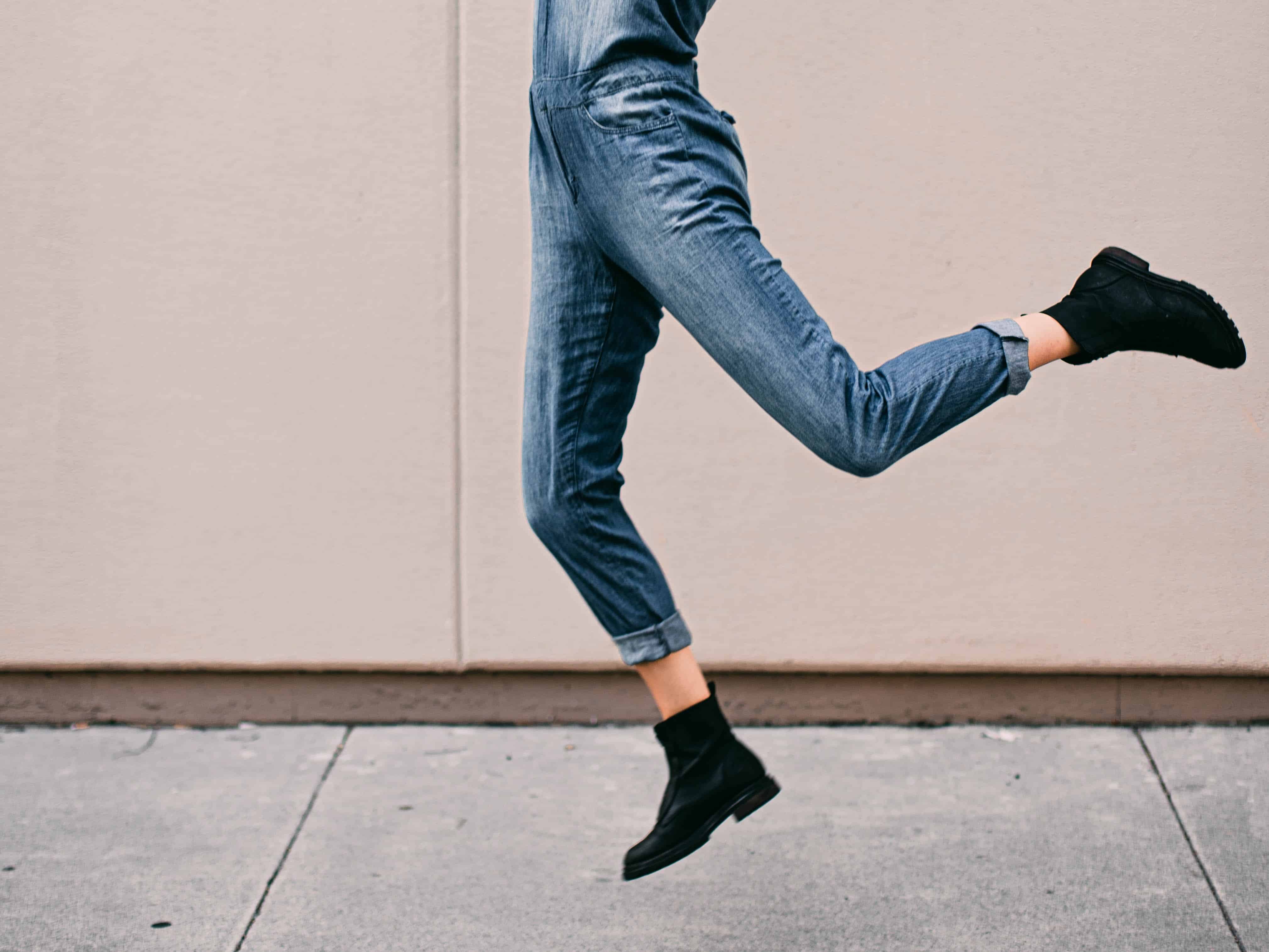Body Parts in French (with Audio)

Knowing how to say the parties du corps (body parts) in French is a key part of building your core vocabulary. What if you need to tell a doctor where you feel pain? What if you need to describe a person? There are plenty of reasons that you need to know vocabulary surrounding the body.
This guide will take you through the most important body parts in French with example sentences to help you see how this vocabulary is used in context.
Download: This blog post is available as a convenient and portable PDF that you can take anywhere. Click here to get a copy. (Download)
Basic Body Parts in French
- La tête — The head
- L’oreille / Les oreilles — The ear / The ears
- L’œil / Les yeux — The eye / The eyes
- Le nez — The nose
- La langue — The tongue
- La bouche — The mouth
- Le bras — The arm
- Les mains — The hands
- La jambe — The leg
- Les doigts — The fingers
Example sentences:
Charles a éternué et s’est essuyé le nez. Il a dit au médecin qu’il ne pouvait rien sentir ni goûter et a commencé à trembler.
(Charles sneezed and wiped his nose. He told the doctor that he couldn’t smell or taste anything and started to shiver.)
La petite fille est tombée dans la rue et s’est coupée la main gauche, qui a saigné. Elle a commencé à pleurer et à appeler sa mère.
(The little girl fell over in the street and cut her left hand, which bled. She started to cry and call for her mom.)
Le petit garçon a bâillé et a fermé ses grands yeux.
(The little boy yawned and closed his big eyes.)
Common French idioms:
Se creuser la tête — To rack your brain (Literally: To dig in the head)
Il se creusait la tête pour trouver des choses à dire.
(He racked his brain for something to say.)
Garder la tête froide — To keep a cool head
Nous devons garder la tête froide pour trouver une solution.
(We need to keep a cool head so we can find a solution.)
Donner sa langue au chat — Used to indicate you give up (Literally: To give the tongue to the cat)
Je donne ma langue au chat.
(I give up.)
Ne pas avoir la langue dans sa poche — To never be at a loss for words (Literally: To not have your tongue in your pocket)
Elle a la réputation de ne pas avoir sa langue dans sa poche.
(She has the reputation for never being at a loss for words.)
Faire la sourde oreille — To choose to ignore (Literally: To make a deaf ear)
Le gouvernement fait la sourde oreille à ces problèmes.
(The government is turning a deaf ear to these problems.)
Ça me fait une belle jambe — That does me a whole lot of good (Literally: This makes me a pretty leg)
Elle est partie ? Ça me fait une belle jambe.
(She left? That does me a whole lot of good.)
Mon œil ! — Yeah, right! (Literally: My eye!)
Il a dit qu’il allait gagner à la loterie. Mon œil !
(He said he’s going to win the lottery. Yeah, right!)
Les doigts dans le nez — Very easily (Literally: Fingers in my nose)
Je l’ai fait, les doigts dans le nez.
(I did it, fingers in my nose!)
Avoir le bras long — To be well-connected (socially) (Literally: To have long arms)
Vous devez avoir le bras long pour réussir dans cette carrière.
(You have to be well-connected to succeed in this career.)
Coûter un bras — To be expensive (Literally: To cost an arm)
Cette voiture coûte un bras.
(That car cost an arm.)
Avoir un poil dans la main — To be very lazy (Literally: To have hair in the hand)
Elle a un poil dans la main.
(She is very lazy.)
Sauter aux yeux — It’s obvious (Literally: It jumps to your eyes)
Le bébé était fatigué, ça sautait aux yeux.
(The baby was tired, that was obvious.)
Head and Face in French
- Le visage — The face
- Les joues — The cheeks
- Le cou — The neck
- La gorge — The throat
- Les cheveux — The hair
- Le front — The forehead
- Les narines — The nostrils
- La mâchoire — The jaw
- Les lèvres — The lips
- Les dents — The teeth
- Le menton — The chin
- Les cils — The eyelashes
- Les sourcils — The eyebrows
Example sentences:
L’athlète musclé a commencé à respirer fortement et a essuyé la sueur de son front.
(The muscular athlete started breathing heavily and wiped the sweat off his forehead.)
Le bébé joufflu et chauve avait le hoquet après avoir mangé et fronçait les sourcils.
(The chubby and bald baby had hiccups after eating and frowned.)
Le visage du grand homme est devenu pâle et il a dit qu’il avait mal à la tête.
(The tall man’s face went pale and he said he had a headache.)
Upper Body Parts in French
- Le corps — The body
- La poitrine — The chest
- Les seins — The breast
- L’épaule — The shoulder
- L’estomac — The stomach
- La taille — The waist
- Le dos — The back
- L’avant-bras — The forearm
- L’aisselle — The armpit
- Le coude — The elbow
- La paume — The palm
- Le poignet — The wrist
- Les jointures — The knuckles
- Le pouce — The thumb
- Les ongles — The fingernails
Example sentences:
La gymnaste petite mais flexible a commencé à rire et a perdu l’équilibre. Son poignet était douloureux à cause de la chute.
(The short but flexible gymnast started laughing and lost her balance. Her wrist was sore from the fall.)
J’ai vu le grand tatouage de l’homme sur son épaule.
(I saw the man’s large tattoo on his shoulder.)
J’ai entendu l’homme musclé se plaindre d’une douleur dans le dos.
(I heard the muscular man complaining about a pain in his back.)
Lower Body Parts in French
- Les hanches — The hips
- Les fesses — The buttocks
- La cuisse — The thigh
- Le genou — The knee
- Le tibia — The shin
- Le pied — The foot
- Les orteils — The toes
- La cheville — The ankle
- Le talon — The heel
- La plante d’un pied — The sole of a foot
Example sentences:
Le petit garçon s’est cogné les orteils contre la porte.
(The little boy stubbed his toes on the door.)
Le grand homme s’est tordu la cheville sur le tapis de course de la salle de sport.
(The tall man twisted his ankle on the treadmill at the gym.)
La grand-mère maigre et frêle est tombée sur son genou au supermarché.
(The thin and frail grandmother fell on her knee at the supermarket.)
Common French idiom:
Casser les pieds à quelqu’un — To annoy someone (Literally: To break someone’s feet)
Son petit frère lui casse les pieds tout le temps.
(His little brother annoys him all the time.)
Internal Body Parts in French
- La peau — The skin
- Le sang — The blood
- Le muscle — The muscle
- Les os — The bones
- Le cœur — The heart
- Les poumons — The lungs
- Le cerveau — The brain
- Les artères — The arteries
- Les veines — The veins
- Les nerfs — The nerves
- Le squelette — The skeleton
- Le foie — The liver
- La rate — The spleen
- Les reins — The kidneys
- La vessie — The bladder
Example sentences:
Le médecin a vu la blessure sur la peau du patient et a essuyé le sang avant de mettre un pansement sur la plaie.
(The doctor saw the injury on the patient’s skin and wiped the blood away before putting a dressing on the wound.)
L’infirmière a écouté les battements de cœur de la grand-mère et lui a dit de se reposer.
(The nurse listened to the grandmother’s heartbeats and told her to rest.)
Le petit garçon est très intelligent. Il doit avoir le plus gros cerveau du monde !
(The little boy is very clever. He must have the world’s largest brain!)
Muscles in French
Note that while some muscles have the exact same spelling in French as their English counterparts, the pronunciations may be different. Click on any word below to hear the correct way to say it in French!
- Les muscles — The muscles
- Les triceps — The triceps
- Le deltoïde
— The deltoid
- Les biceps — The biceps
- Les obliques — The obliques
- Le trapèze — The trapezius
- Le pectoral / Les pectoraux — The pectoralis / The pecs
- Les muscles abdominaux / Les abdos — The abdominal muscles / The abs
- Le fessier — Gluteus maximus (The glutes)
- Les quadriceps — The quadriceps
- Le tendon — The tendon
- Les ischio-jambiers — The hamstrings
- Les mollets — The calves
Example sentences:
Le coureur maigre et poilu avait des muscles tendus après avoir couru le marathon de Paris.
(The thin and hairy runner had strained muscles after running the Paris Marathon.)
Le médecin a touché les mollets du patient pour examiner la blessure.
(The doctor touched the patient’s calves to examine the injury.)
Le randonneur a cligné des yeux et essuyé ses larmes après s’être blessé aux tendons.
(The hiker blinked and wiped his tears away after injuring his tendons.)
Body Parts in French: A Quick Grammar Lesson
In French, we use a definite article (i.e. “the”) to talk about body parts, rather than a possessive article (i.e. “my”) like we do in English.
The exception to this rule is if another person is involved: In that case, you’ll need to use the relevant possessive adjective, so it’s clear whose body part you’re referring to.
You’ll also need to match the gender of the body part to the correct article and adjective form. That’s right, even body parts have genders in French! We have included the matching article in the vocabulary list below, so you can tell a word’s gender by checking the definite article it’s attached to:
- La — the (feminine, singular)
- Le — the (masculine, singular)
- L’ — the (masculine or feminine, followed by a vowel)
- Les — the (plural)
How to Memorize French Body Parts
At this point in the post you may be a bit overwhelmed. This is a whole lot of words! How do you memorize them all!? Simply follow these tips for remembering body parts in French:
- Use the expressions: It’s easier to remember words with expressions and idioms, especially when the meaning is silly. So you’ll remember better that les doigts means “fingers” and le nez means “nose” when you remember them as part of the expression “les doigts dans le nez” (fingers up my nose).
Make up your own funny expressions with the rest of the words to help you remember them all!
- Use native media to hear the body parts used in context: Another great way to memorize body parts in French is to hear the vocabulary in action in the context of authentic French conversation. If you can’t hang out with native French speakers, you can accomplish this by watching French media like talk shows or even French YouTube channels.
You could also try using a language learning program that is focused on immersion, like FluentU.
FluentU takes authentic videos—like music videos, movie trailers, news and inspiring talks—and turns them into personalized language learning lessons.
You can try FluentU for free for 2 weeks. Check out the website or download the iOS app or Android app.
P.S. Click here to take advantage of our current sale! (Expires at the end of this month.)
- Say the words often: Use the words throughout your day, as often as you can. For instance, you can narrate your day: When you wake up in the morning, say “Je tends le bras” (I am stretching my arm) as you reach overhead, or “Je me brosse les dents” (I am brushing my teeth).
- Sing along to children’s songs: When you learned the body parts in your native language as a kid, you probably used songs to help you along.
Do you remember the song “Head, Shoulders, Knees and Toes”? The French language has its own version of that song! You can also listen to this song, which adds numbers into the mix, or this song, which uses the parts in complete sentences.
Now that you know all this new vocabulary and have seen it used in example sentences, you’ll be able to talk about your body in any situation you need to!
Download: This blog post is available as a convenient and portable PDF that you can take anywhere. Click here to get a copy. (Download)
And one more thing...
If you like learning French vocabulary on your own time and from the comfort of your smart device, then I'd be remiss to not tell you about FluentU.
Other sites use scripted content. FluentU uses a natural approach that helps you ease into the French language and culture over time. You’ll learn French as it’s actually spoken by real people.
FluentU has a wide variety of great content, like interviews and web series, as you can see here:

FluentU brings native videos within reach with interactive subtitles.
You can tap on any word to look it up instantly. Every definition has examples that have been written to help you understand how the word is used.

For example, if you tap on the word "crois," you'll see this:

Practice and reinforce all the vocabulary you've learned in a given video with FluentU's adaptive quizzes. Swipe left or right to see more examples for the word you’re learning and play the mini-games found in the dynamic flashcards, like "fill in the blank."

As you study, FluentU tracks the vocabulary that you’re learning and uses this information to give you a 100% personalized experience.
It gives you extra practice with difficult words—and reminds you when it’s time to review what you’ve learned.
Start using the FluentU website on your computer or tablet or, better yet, download the FluentU app from the iTunes or Google Play store. Click here to take advantage of our current sale! (Expires at the end of this month.)














